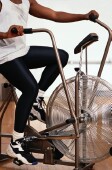- Double Mastectomy May Offer No Survival Benefit to Women With Breast Cancer
- Toxic Lead Found in Cinnamon Product, FDA Says
- Certain Abbott Blood Sugar Monitors May Give Incorrect Readings
- Athletes Can Expect High Ozone, Pollen Counts for Paris Olympics
- Fake Oxycontin Pills Widespread and Potentially Deadly: Report
- Shingles Vaccine Could Lower Dementia Risk
- Your Odds for Accidental Gun Death Rise Greatly in Certain States
- Kids From Poorer Families Less Likely to Survive Cancer
- Tough Workouts Won’t Trigger Cardiac Arrest in Folks With Long QT Syndrome
- At-Home Colon Cancer Test Can Save Lives
Study Probes Why Exercise Leaves Women More Breathless Than Men


FRIDAY, Nov. 8It’s widely known that women find it harder to breathe during exercise than men of a similar age — even among those with heart and lung disease. And now researchers say they’ve discovered why.
A new study says women have more severe shortness of breath than men during exercise due to greater electrical activation of their breathing muscles.
The research, published Nov. 8 in the journal Experimental Physiology, is the first to explain why this happens, the study authors said.
Canadian researchers looked at 50 healthy, nonsmoking men and women aged 20 to 40. The study participants worked out on a stationary bicycle while their heart, lung and other body functions were monitored. At regular intervals during the workout, the participants rated their levels of breathlessness.
“Our findings indicated that greater electrical activation of the respiratory muscles during exercise in women is needed to compensate for their smaller lungs, airways and breathing muscles,” study leader Dr. Dennis Jensen, of McGill University in Montreal, said in a journal news release.
The authors said the findings could aid researchers and health care providers in identifying new methods of improving the symptoms of breathlessness and boosting exercise capacity among groups including seniors and people with chronic heart and lung disease.
Additional research is required to determine if these findings also are true in other groups of men and women, such as those who are overweight or obese, Jensen said.
More information
The U.S. Office on Women’s Health has more about exercise.
Source: HealthDay
Copyright © 2024 HealthDay. All rights reserved.










